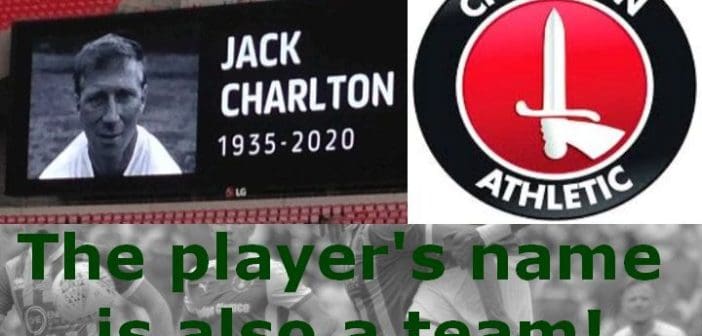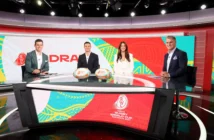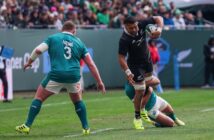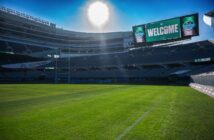The off season between 19/20 and 20/21 may be the shortest on record, but never let it be said that Prost International neglected its obligation to the kind of off season journalistic pap, loved only by our fellow football obsessives.
In this recurring feature, we look at some of the world’s best known and, in future articles most obscure, players who share their surname with a football club.
We start with and wrote in honour of the great Jack Charlton who died earlier this month, and who shares his surname with one of south east London’s most celebrated clubs, Charlton Athletic.
Jack Charlton – a hero in two countries
Jack and Bobby Charlton were born in Ashington, Nothumberland. They both went on to play in England’s World Cup winning side of 1966 and achieve many honour at club level.
Jack played 629 games for Leeds United, winning the League, FA Cup, League Cup and Charity Shield once each as well as the Inter-Cities Fairs Cup twice between 1968 and 1972. He played in a side that contained Paul Reaney, Terry Cooper, Norman Hunter, Paul Madeley, Jonny Giles, Billy Bremner, Eddie Gray, Frankie Gray, Alan Clarke, Terry Yorath, Joe Jordan and Peter Lorimer.
They were a tough side and in the end, their talent should probably have won them more trophies. Charlton scored six goals for England and also netted in the 1970 FA Cup final in that famous 2-2 draw with Chelsea that would send VAR into meltdown if played today

Jack Charlton is honoured at Wembley before the Wycombe v Oxford League 1 play-off
He went on however to become a hero in a second country when he took over the management of the Republic of Ireland in December 1985. He guided them to EURO ’88 where they famously beat England in Stuttgart.
His first campaign seemed at first to have resulted in failure. With all games played, Bulgaria just need a point at home to a Scotland side with nothing to play for. Gary Mackay scored the only goal of the game to send Ireland to the Euro 88 finals in Germany where they famously beat England in their group. Ironically, it was another Scot, Ray Houghton, who scored that goal against England in Stuttgart.
The Republic didn’t go further in the tournament, but made a real impact in the 1990 World Cup. The qualifying group contained Spain, Hungary, Northern Ireland and Malta. Although they failed to score in their first three games, four home wins changed their fortunes. Finally a win in Malta secured their place at Italia 90.
Three draws saw them qualify fro the group stage and Charlton’s tournament came to life with a penalties win over Romania after a fourth draw. They eventually succumbed to a 1-0 loss to the hosts, leaving Italy as heroes despite failing to win a single game out of the five they played.
Charlton led the Irish again to the 1994 World Cup Finals in the USA where they famously beat Italy 1-0 at Giants Stadium, Houghton again being the scorer. He resigned after failing to qualify for EUR) 96 but he had changed Irish football forever.
Charlton Athletic – the club with some of the finest nicknames … and Derek Hales
 Charlton Athletic are one of London football’s more likeable clubs.
Charlton Athletic are one of London football’s more likeable clubs.
According to that famous 2013 fan survey on football rivalries, Charlton fans consider their main rival to be Crystal Palace, with Millwall being their second biggest rival. The resentment is not returned.
Millwall consider their main rivals to be West Ham United, with Palace placed second and Charlton a poor third despite the geographical proximity.
Crystal Palace fans consider their main rivals to be Brighton, despite the geographical lack of proximity. Millwall come second with Charlton again only third.
Formed in 1905, Charlton have spent most of their existence outside the top tier. They’ve had just 33 years in the top drawer spanning four separate periods: 1936–1957, 1986–1990, 1998–1999, and 2000–2007.
They won the FA Cup in 1947 and finished second in the league ten years previously.
Most of their live has been spent at their current stadium, The Valley with some controversial ground sharing with Crystal Palace and West Ham between 1985 and 1992.
Most famous for one of the larger playing areas in English football, which for many years was second only to Manchester City’s Maine Road. They are also famous for the first substitution in a league game when Keith Peacock came on after just 11 minutes to replace injured goalkeeper Mike Rose against Bolton Wanderers on 21 August 1965.
Keith Peacock scores the winner for Charlton at Gillingham in the 1974/75 season
Charlton also have not one but two of the more interesting nicknames in English football.
The Valiants refers to their home stadium name the Valley, but no-one is totally sure where their other nickname, the Addicks, comes from. Some say it’s a shortened form of Athletic. Others claim it’s a derivation of the word haddock. Once a local fishmonger, Arthur “Ikey” Bryan, rewarded the team with his own haddock and chips.
They are occasionally also called the Red Robins, and when they clinched promotion at Wembley, it was the Red Red Robin song that was played at full time.
No Charlton article should ever go to print without mentioning legendary goalscorer Derek Hales.
In 321 games for Charlton, he scored 148 goals. Despite spells at Derby and West Ham, he saved his best form for the Valiants.
His scoring partnership with Mike Flanagan (109 goals in 347 appearances) was the stuff of legends although the two did have one of football’s most famous punch ups between team mates when they clashed against Maidstone.
Many of Charlton’s heroes appear in the excellent video below, which does far greater tribute to them than any writer ever could.
Sadly the club fell out of the Championship this year, with many pointing the finger at Lyle Taylor, the striker who refused to play after the lockdown, fearing an injury that would scupper a transfer. Neither did Chris Solly and David Davis who was on loan from Birmingham.
There are clubs in worse positions about to enter League One and at least Charlton know they have one of the most loyal fanbases behind them for what lies ahead.
The player’s name is also a team
Follow us on Twitter @ProstInt
Charlton
Nothing Found
Apologies, but no results were found for the requested archive. Perhaps searching will help find a related post.
![Prost International [PINT]](https://prostinternational.com/wp-content/uploads/2021/08/PINTtFontLogoRoboto1536x78.jpg)



